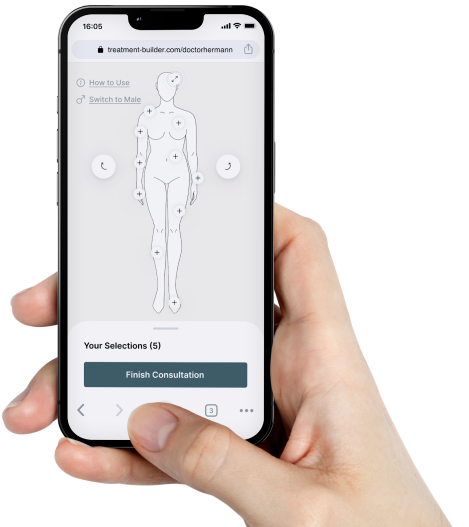If you have concerns about your weight, then we would be happy to help you find a weight loss plan that’s right for you. Even if you are at a healthy weight, and you have concerns about your appearance or your health, we can still find solutions via our wellness treatments or our body contouring options.

What We Do
Weight loss can be a difficult, daunting journey, and you may not even know where to begin. Starting from your first consultation at Hermann Aesthetics & Wellness, we tailor your medically supervised weight loss program to your lifestyle and your goals. Our medical weight loss clinic in St. Petersburg will support you through nutrition guidance, exercise improvement, dietary supplementation, prescription medication, and sleep optimization. Our methods also include:
- Semaglutide
- Tirzepatide
- Naltrexone
- Glutathione
- Supplements
- Body composition analysis
- BVital and probiotic fat burner shots
- Body contouring (for those who desire it)
What to Expect
The Medical Weight Loss Process
Personal Consultation
In your initial visit for medical weight loss, you’ll meet one-on-one with one of our providers. You’ll discuss your weight loss history and overall goals for your health. Together, you and your provider will create a plan that will help you establish healthy habits and successfully lose weight.
Treatment Plan
Because every person is different, your plan at our weight loss clinic in St. Petersburg will be tailored to your needs. We will guide you on better habits and lifestyle changes for nutrition, exercise, and sleep, while providing you with medications and supplements as needed.
Ongoing Progress
Weight loss takes time, but that’s why we’re here to help you through every step. You’ll meet with your weight loss expert regularly to perform body scans, get questions and concerns answered, and adjust your plan as your needs evolve.
Lasting Solutions
Our team at Hermann Aesthetics is here to provide you with the resources and tools necessary to help you maintain your goals. With our comprehensive weight loss solutions, we want you to achieve sustainable, effective, and healthy results.
Why Start Your Custom Weight Loss Journey
Our team at Hermann Aesthetics understands how difficult weight loss can be. We aim to be there with you and provide the best experience (and results) possible at our weight loss clinic in St. Petersburg.
Personalized Treatment
You can count on the results you will achieve with our weight loss plans, because they are customized to your specific goals and unique physiology.
Improved Health
We not only assist you with your weight loss goals, but with your other concerns as well to promote better health and, therefore, a better life.
Medical Supervision
Our medical weight loss program is overseen by providers who have years of experience and who take the time to make sure your weight loss is done right at every step.
Hear Dr. Hermann on Weight Loss
Watch Video


Your Best Self Is Calling
Losing weight and improving your health is simpler than ever. Start finding your solutions with our treatment builder.

Medical Weight Loss FAQs
How much weight you lose varies from person to person. The best way to know how much weight you can lose is by meeting with our team for a consultation.
At Hermann Aesthetics & Wellness, we can administer semaglutide, tirzepatide, naltrexone, glutathione, and B12 or probiotic supplements for weight loss. Semaglutide and tirzepatide are peptide therapies that reduce hunger and simulate the feeling of fullness to help you decrease your caloric intake. Naltrexone helps minimize cravings for food or alcohol. Glutathione encourages your body to detoxify while improving your metabolism. B12 and probiotic supplements, administered as injections, can boost your energy and assist with your metabolism as well.
We will carefully evaluate which of our methods may best help you during your initial consultation at our weight loss clinic in St. Petersburg.



Your Weight Loss Team
With our team at Hermann Aesthetics & Wellness, you can achieve your goals to look and feel your best every day. Our medical director, Dr. Anne Hermann, is a board-certified internal medicine physician who is also board-certified as a physician nutrition specialist.
Our expert team members and providers have received national recognition for their expertise and skill. Their exceptional work has made us a leader in the industry.
We make sure to offer only the best treatments available. This means we stay updated on the latest treatments and services available, making sure to stay at the forefront of aesthetic medicine.
Everybody is different. We love that diversity and accommodate it by customizing everyone's treatment to their unique needs. This helps us make sure everyone that comes to us can accomplish their goals.
Here to Help You Achieve Success
We make confidence easier with our weight loss treatments.
Take the first step towards loving your body by scheduling an appointment with our team today.







